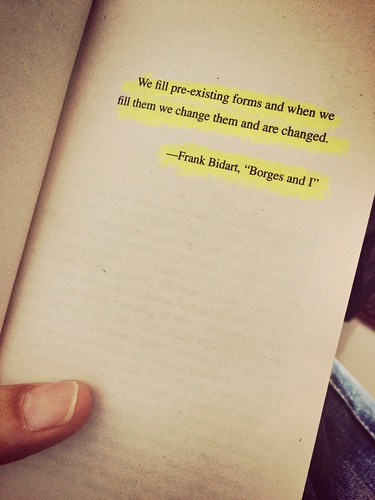38: What is the best way to receive feedback? #LifeWideLearning16 @MrChase
— Ben Wilkoff (@bhwilkoff) February 7, 2016
After last night’s improv show, I was sitting in the lobby of the theater as the last few audience members were leaving. “Great show,” a few of them said, “That was really funny, and I had no idea where it was going.”
“Thank you,” I said.
Last night was one of the rare occasions I was in agreement with them. It had been a fun show. The group was listening, playing around the fringes of chaos, and still paying attention to when we needed to calm a scene or “rest the game”. While far from perfect, it was a good show. I could agree with those audience members.
This is different than many shows where the quality to which we aspire and what actually ends up happening on stage are significantly different. After these shows, inexplicably, audience members still offer what feels like genuine positive feedback on the performance. These are the hardest “good shows” to hear.
Internally, I think, “Were we at the same show?” and begin to tick off the myriad moves I should have made and didn’t. I map the imperfect listening and the lines I thought would land, but flopped when they made it to the audience.
Externally, I say, “Thank you.”
Time was that I would say thank you and keep internally accounting for all of my flaws in the show. After almost two decades of performing improv, I’m getting better at realizing mine isn’t the only valid perspective on a show.
For everything I would or could have done better, the audience members who honestly compliment a show I think went down the tubes can recount a moment that made them laugh, surprised them, or pulled them more closely to a world that didn’t exist before the show started and will never exist again.
And that’s the lesson. Were they to pick at the flaws of a show (while socially awkward), I’d be right there with them. “When you went to do X, but the other person did Y, it looked like you all didn’t know what to do next,” would bring me into the conversation fully.
Acknowledging what we did right, though, is a more difficult pill to swallow. It means not only seeing the world from another person’s perspective, it means seeing me from another person’s perspective and deciding to like what I see. This is not easy.
Yet, it’s exactly what I asked high school students to do when I implemented High Grade Compliments. The thing I was prepared for in helping my students formulate specific, positive comments for their peers was the mining and speaking their thinking. Seeing the good in another person and speaking that good to them are two different things.
Remarkably, they took to this quickly. They’d been paying attention to what they appreciated in their classmates all along, it seems. What they struggled with – to the development of deep blushing, nervous smiles, and an inability to hold eye contact – was hearing someone else call out how they made our classroom a better place.
It’s why I added coaching on the receiving of compliments to the process. The rule was simple, “Really listen to what they are saying and then say, ‘Thank you’.”
School, life, and any number of outside forces had tuned them in to hearing criticism from others and even accepting it. And while critique has its place in the building of better ideas and examining beliefs, it shouldn’t be our default when people start to talk about us or our work. Living in the belief that the world wants you to know what’s wrong with what you’ve built doesn’t lend itself well to inspiring the building of new things.
It was the teaching of this lesson to assembled adolescents that shifted my practice in improv. Urging others to be open to what their peers might appreciate about themselves meant I needed to shift my listening as well.
Now, when shows don’t go as well as they did last night and an audience member’s opinion of a performance is more positive than my internal damning, my thank you is internally followed by, “…for making me take the time to realize there was more good there than I was willing to see.”
This post is part of a daily conversation between Ben Wilkoff and me. Each day Ben and I post a question to each other and then respond to one another. You can follow the questions and respond via Twitter at #LifeWideLearning16.

